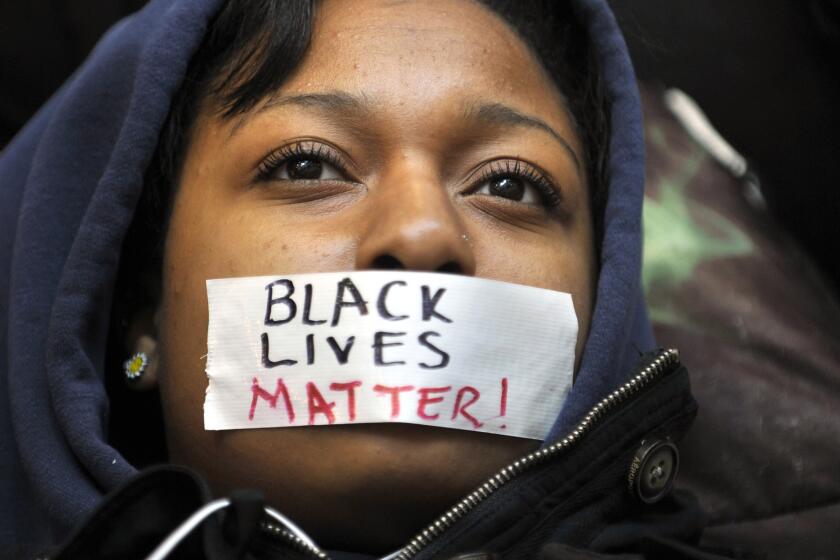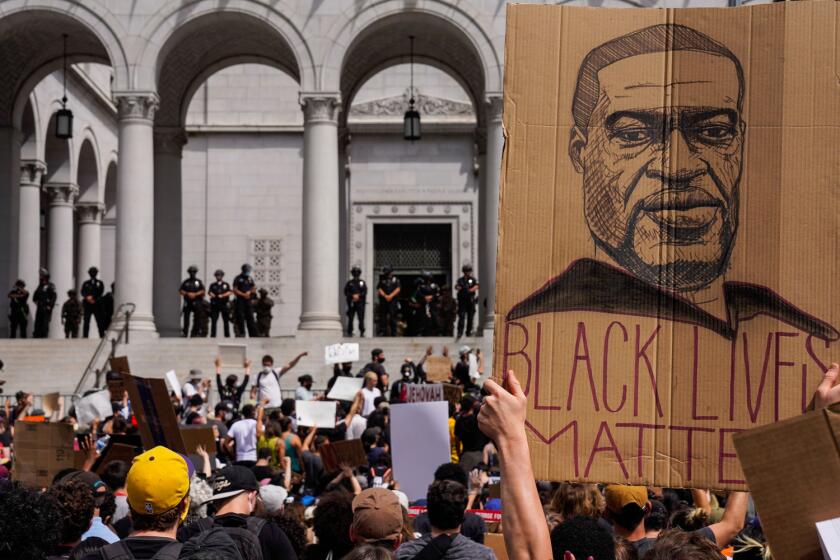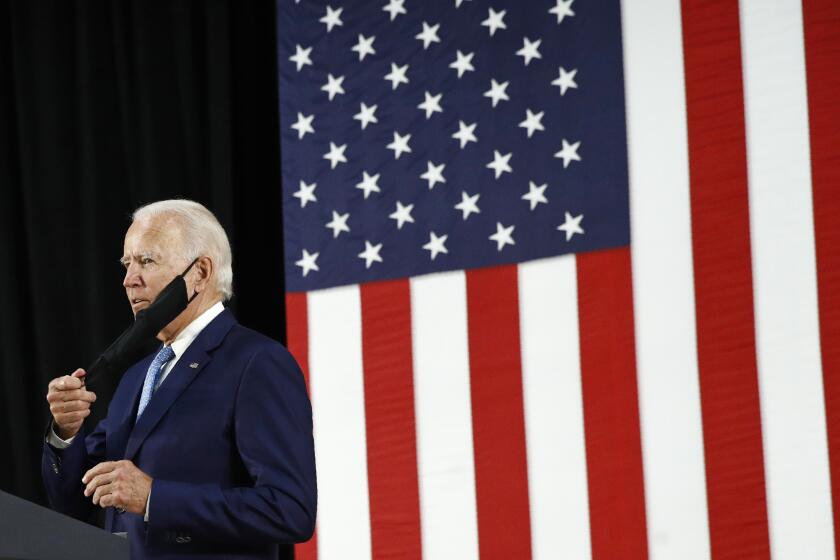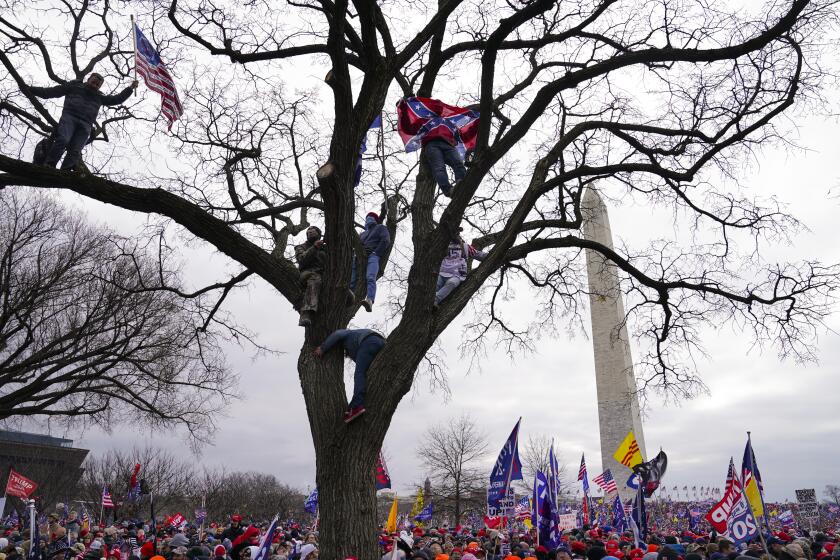Biden withdraws panned Trump administration report promoting ‘patriotic education’
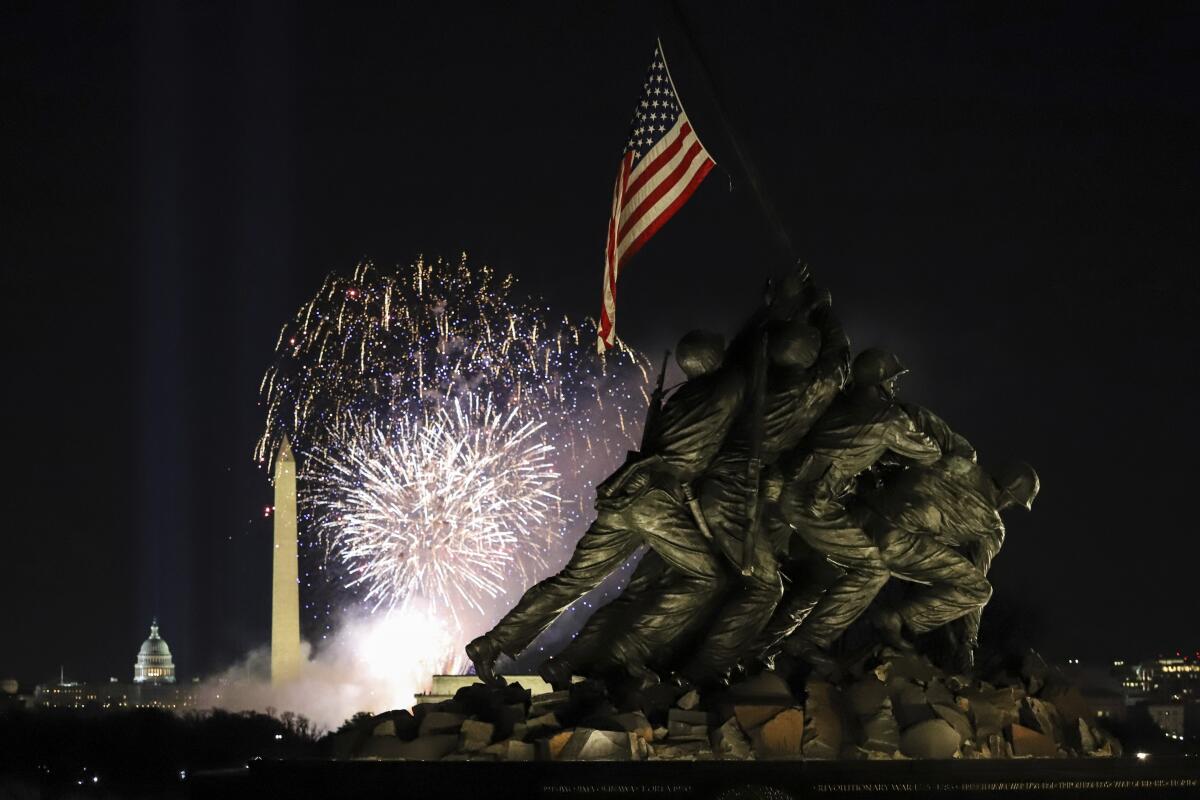
- Share via
President Biden on Wednesday withdrew a recent Trump administration report that aimed to promote “patriotic education” in schools but that historians mocked and rejected as political propaganda.
In an executive order signed on his first day in office, Biden disbanded his predecessor’s 1776 Commission and withdrew a report it released Monday. Trump had established the presidential commission in September to rally support from white voters and as a response to the New York Times’ “1619 Project,” which highlights the lasting consequences of slavery in America.
In its report, which Trump hoped would be used in classrooms across the nation, the commission glorifies the country’s founders, plays down America’s role in slavery, condemns the rise of progressive politics and argues that the civil rights movement ran afoul of the “lofty ideals” espoused by the Founding Fathers.
The panel, which included no professional historians of the United States, complained of “false and fashionable ideologies” that depict the country’s story as one of “oppression and victimhood.” Instead, it called for renewed efforts to foster “a brave and honest love for our country.”
Historians widely panned the report, saying that it offers a false and outdated version of American history that ignores decades of research.
“It’s an insult to the whole enterprise of education. Education is supposed to help young people learn to think critically,” said David Blight, a Civil War historian at Yale University. “That report is a piece of right-wing propaganda.”
In an increasingly desperate attempt to shore up his base, Trump is attacking diversity training and a newspaper project about slavery.
Trump officials heralded the report as “a definitive chronicle of the American founding,” but scholars say it disregards the most basic rules of scholarship. It offers no citations, for example, or list of its source materials.
It also includes several passages copied directly from other writings by members of the panel, as one professor found after running the report through software that’s used to detect plagiarism.
Matthew Spalding, the panel’s executive director and a vice president at the conservative Hillsdale College in Michigan, denied any wrongdoing, saying the panel’s members “contributed our own work and writing, under our own names, to the 1776 Report, which was an advisory report to the president.”
Spalding and other commission leaders did not immediately respond to other criticism leveled at the report.
Alicia Keys, Mary J. Blige, Khalid and other prominent Black musicians detail “17 More Ways You Could Be Killed If You Are Black in America” in a new video.
In his order dissolving the panel, Biden said it “sought to erase America’s history of racial injustice.”
The American Historical Assn. condemned the document, saying it glorified the founders while ignoring the histories and contributions of enslaved people, Indigenous communities and women. In a statement also signed by 13 other academic groups, the organization says the report seeks “government indoctrination of American students.”
The sharpest criticism of the report was directed at its presentation of slavery and race. The report attempts to undermine allegations of hypocrisy against Founding Fathers who owned slaves even as they espoused equality. It also attempts to soften America’s role in slavery and explain it as a product of the times.
“Many Americans labor under the illusion that slavery was somehow a uniquely American evil,” the panel wrote in the 20-page report. “The unfortunate fact is that the institution of slavery has been more the rule than the exception throughout human history.”
Trump’s and Biden’s reactions to racial injustice and protests illuminate how they approached the issue of race throughout their political careers.
Blight, at Yale, compared it to “a sixth- or seventh-grade kind of approach to history — to make the children feel good.” He added: “But it’s worse than that, because it comes out of an agenda of political propaganda.”
The authors of the report argue that the civil rights movement was distorted to advance programs promoting inequality and “group privilege.” It complains, for example, about affirmative action and other forms of “preferential treatment.”
Ibram X. Kendi, a scholar and historian of racism at Boston University, called the report “the last great lie from a Trump administration of great lies.”
“If we have commonly been given preferential treatment, then why do Black people remain on the lower and dying end of nearly every racial disparity?” Kendi said on Twitter. “Whenever they answer this question, they express racist ideas of Black inferiority while claiming they are ‘not racist.’”
Biden’s pledge to attack racial injustice contrasts with Trump’s stoking of white resentment at Mt. Rushmore.
Other scholars underscored what was left out. The report includes nothing of Native American history, and its only reference to Indigenous people is a racial slur quoted from the Declaration of Independence.
In one passage jeered by historians, the authors draw a comparison between the progressive movement in America and fascist Italian dictator Benito Mussolini.
James Grossman, executive director of the American Historical Assn., said the report is intended to discredit contemporary public policies rooted in America’s progressive reform movement. He worries that, even after Biden dissolved the commission, its report could end up in some classrooms.
“Historians need to be paying attention to curriculum conversations in localities and at the state level,” Grossman said. “The nonsense that’s in this report will be used to legitimate similar nonsense.”
Both within and outside the walls of the U.S. Capitol, banners and symbols of white supremacy and anti-government extremism were on display as an insurrectionist mob swarmed the Capitol last week.
In a public meeting of the commission this month, some members held out hope that Biden would keep the commission alive. Others said they needed to push the report to state and local education officials.
“It’s really going to be up to governors and state legislators and school board members and parents and higher education commissioners, even students, to take this charge and carry this work forward,” said Doug Hoelscher, a White House assistant under Trump.
After the report was removed from a White House website, some of its authors moved to make it available on conservative websites. In an opinion piece published by the Heritage Foundation, one of the commission members, Mike Gonzalez, said the members “intend to continue meeting and fulfilling the charges of our two-year remit.”
The report ultimately demands a shift in teaching at schools and at U.S. universities, which the panel describes as “hotbeds of anti-Americanism.” It denounces any teaching that it says breeds contempt for American ideals, blaming that kind of “destructive scholarship” for the nation’s divisions and for “so much of the violence in our cities.”
“To restore our society,” the report says, “academics must return to their vocation of relentlessly pursuing the truth and engaging in honest scholarship that seeks to understand the world and America’s place in it.”
Collin Binkley writes for the Associated Press.
More to Read
Sign up for Essential California
The most important California stories and recommendations in your inbox every morning.
You may occasionally receive promotional content from the Los Angeles Times.
